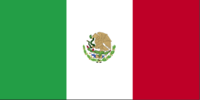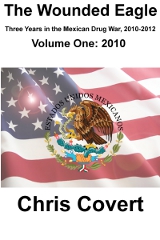Anatomy of a Mexican Political Crisis: The Initial Trajectory

2011-02-28
Posted by: badanov
by Chris Covert
You gotta have some sympathy for Humberto Moreira, the newly coronated president of Mexico's Partido Revolucionario Institucional (PRI).
One week before walking into the position, a former governor of the state of Nuevo Leon was quoted in the Mexican press that when PRI presidents were in power, PRI didn't have the national problem with violence because drug routes were allocated to the drug cartels by the various state's governors.
Oops.
Since that moment last Wednesday, political rivals and allies alike including Gustavo Madero, president of the Partido Accion National (PAN) and Carlos Navarrete, coordinator in the Mexican senate for the Partido Revolucion Democartica (PRD) have weighed in with their own unique views, with PRD's remarks confirming Wednesday's remarks as an "open secret" thereby complicating the response of PRI.
Carlos Navarrete's remarks seems to have provided PAN with a rare enough political opening for them to simply sneer, "We don't do accommodations with criminals" retort, which also happens to be the current government's policy.
Were it not for the tragedy of more than 30,000 individuals killed in drug and gang related violence since President Felipe Calderon Hinojosa's declaration of war on the drug cartels in 2006, the amount of spinning being done by the PRI would be hilarious. It is hard to imagine Calderon not getting a chuckle out of the remarks and the attempts by the PRI to deal with the political fallout in the early going.
Socrates Cuauhtemoc Rizzo Garcia, the 66 year old former governor of Nuevo Leon, made his remarks at a seminar at the law school of the Universidad Autonoma de Coahuila in Saltillo, Coahuila last Wednesday, outlining that governors during the terms of PRI presidents before 2000, assigned routes and areas through which cartels could ship their goods and where they could operate without fear of interference from state and local governments.
In his remarks as reported by Milenio, Rizzo Garcia did not single out a president although he did serve as governor of Nuevo Leon from 1991 to 1996, which would span two PRI president's terms, Ernesto Zedillo from 1994 to 2000, and Carlos Salinas de Gortari from 1988 to 1994. He was known to be close, however, to Salinas de Gortari.
"...but there was a control (when we) had a strong state and a strong president and a strong attorney and tight control of Army, and then somehow was said 'you go through here, you here, but do not touch anyone in these places...'", Rizzo Garcia is quoted as saying.
Rizzo Garcia added that governors were not necessarily those who determined the routes. "Everything was decided from the capital and the governors were less independent", he added.
He also said that before money transfers such as drug sale proceeds between the United States and Mexico were so closely monitored and restricted, and domestic drug consumption was very low. He said that the beginning of the domestic drug market in Mexico marks the start of drug cartel violence.
Rizzo Garcia also lamented that PAN president Vicente Fox did not follow up on PRI's strategies.
The Milenio report does not recount the reactions of the law students in Saltillo, although it would be hard to imagine the students weren't stunned by the revelations. The current Mexican political establishment, especially the PRI, certainly was.
Reaction was swift. PAN's Madero took time out of a speaking tour in Nuevo Leon to criticize the remarks and to express his surprise the "narcopacts" would even be mentioned.
"A strong president is one who will not deal with criminals", said Madero. Madero also said he thought that the deals with the cartels were common knowledge at the time and he was surprised the revelation was made.
Shortly afterwards PRI senator Manlio Fabio Beltrones Rivera denied such pacts were ever made.
Manlio Fabio Beltrones Rivera, who served as governor of Sonora between 1991 and 1997, lamented the remarks do little to address the current problem of drug abuse and violence. His reaction clearly means the PRI doesn't want to "go there".
Former Chihuahua governor, Fernando Baeza Melendez affirmed Beltrones Rivera.
"There was no direct or indirect dealings with drug traffickers to give them any support. Consumption has grown in recent years, there was a series of conflicts because there was no struggle for the market," Baeza Melendez is quoted by Milenio as saying.
The former governor of Quintata Roo, Pedro JoaquÃÂn Colwell, told reporters that Rizzo Garcia's is a personal opinion he does not share. Pedro JoaquÃÂn Colwell served as governor between 1981 and 1987.
Not satisfied with the denials, the coordinator for the PAN faction in the Mexican senate Friday, José Gonzalez Morfin, called on Salinas de Gotari, Miguel de la Madrid and Zedillio, to confirm or deny the allegations Thursday evening.
"I think it would be good if you explain to people what was really what happened and maybe that would begin to tell all Mexicans what we are now suffering", he said.
Milking PRI's faux pas as much as possible at a Zocalo Flag Day ceremony Friday, President Calderon reaffirmed what Madero and Gonzalez Morfin had already said.
"It is clear that the surrender, the surrender, in the submission, the resignation or transaction in the dark there is not, nor will there ever be true peace. The only lasting peace is one that is secured by the rule of law, prevail by the Constitution, laws deriving from it, the rule of law in which Mexicans have decided to live, any interest over and above any ambition", he said.
Calderon's remarks are by every possible definition, a deft twisting of the blade into his opponents, while affirming his party's position on law and order.
Recognizing the PRI spin offensive was in full swing a Coahuila deputy, Mario Delgado Davila, managed to get his remarks published Friday in which he warned a number of PRI actors would present their case that the "narcopacts" were not real. Elections are on the line.
Moreira's management of the crisis appeared to be weak as well. His predecessor, Beatriz Paredes Rangel is preparing to step down as leader of the PRI after a stunning series of victories in state governorships in 2010. The crisis could not have come at a worse time for the PRI.
Looking surprised in published photos, Moreira admitted Friday that, yes, PRI presidents were in power when the alleged pacts were made, but he wanted to remind the press Sinaloa drug cartel leader Joaquin Guzman Loera AKA "El Chapo" escaped during the years of Vicente Fox.
The last and perhaps most damaging of all were the remarks by Carlos Navarrete who said the allegations were "nothing we have not discussed in private during the regimes of the PRI..."
Moreira's defense of PRI was weak to be sure, and surely more was to said, but it wouldn't be by his opposition and it did not come from Moreira himself.
Next: Anatomy of a Mexican Political Crisis: The Terminal Phase



